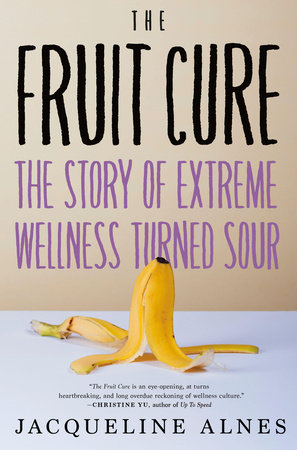The Fruit Cure Reader’s Guide
By Jacqueline Alnes


1. Alnes writes about how messaging from her coaches around overcoming pain in sport meant that she tried to push herself past her limit, even when her symptoms were severe. Are perceptions of mental and physical health shifting due to ongoing public conversations?
2. Because of her neurological episodes, Alnes writes that her memories of her illness are foggy, and that “holes in the narrative emerge.” Does this admission lead you to trust the author more or less? What expectations do you have around truth and memory in memoirs?
3. The author writes about how cultural perceptions of epilepsy and seizures—often historically associated with demons needing to be cast out of a person—negatively influenced her perception of her own neurological symptoms. What stigmas or stereotypes have you heard about a chronic illness or disability?
4. Throughout the book, Alnes contemplates the differences between healing and a cure. Is there a difference? Explain.
5. Alnes incorporates historical research in which she connects present messaging around wellness to the past. What historical moments or figures in the book surprised or intrigued you?
6. Alnes was drawn into an online community of fruitarians, but later wishes she would have paused to analyze the harmful rhetoric before it sucked her in. What questions might be valuable to ask when you encounter media or messaging that seems alluring? What steps can you take to learn more about a creator or account before following them?
7. Online communities can be incredible spaces where people with similar interests can communicate from anywhere in the world. They can also become insular echo chambers that ensnare vulnerable populations. What is your perception of the 30 Bananas a Day group? What elements of the group seem positive? What elements seem unhealthy?
8. Alnes interviewed several former members of the fruitarian movement for her book. Did you notice any themes emerge in these interviews?
9. Two of the central figures in the 30 Bananas a Day community, Freelee and Durianrider, declined multiple interview requests from the author. In what ways does Alnes work to include their perspectives? Does the author’s portrayal of the movement’s leaders feel nuanced and balanced?
10. The author raises questions about whose responsibility it is to monitor accounts that distribute health advice on social media platforms, as she reflects on the potential harm caused by creators who advocate for diet plans with no credentials to back up their claims. Who should be held responsible for monitoring accounts on social media that dispense health advice? Is it up to viewers to think critically, creators to prove their credibility, or social media companies to provide content warnings?
Just for joining you’ll get personalized recommendations on your dashboard daily and features only for members.
Find Out More Join Now Sign In